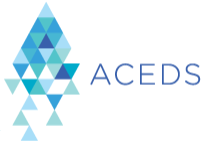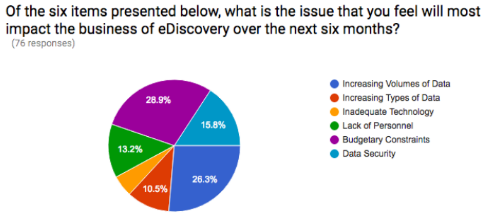This is the seventh of the 2016 LegalTech New York (LTNY) Thought Leader Interview series. eDiscovery Daily interviewed several thought leaders at LTNY this year to get their observations regarding trends at the show and generally within the eDiscovery industry. Unlike previous years, some of the questions posed to each thought leader were tailored to their position in the industry, so we have dispensed with the standard questions we normally ask all thought leaders.
Today’s thought leader is Pete Feinberg. Pete is Senior Vice President of Product Strategy at Consilio, responsible for the overall product strategy and product management of Consilio’s products and services line. Prior to joining Consilio, Pete ran marketing for the largest vertical of Blackboard – a Washington DC-based education technology company. Prior to that, Pete served as vice president in various product, partner marketing and eCommerce roles at a variety of B2B software and B2C eRetail companies in the Washington DC area. Pete’s specialties are in guiding product strategy, bringing new products and services to market, representing the voice of the client as an executive “client advocate”, and guiding the service delivery organization to engage with clients not as a vendor, but instead as a trusted advisor.
What are your general observations about LTNY this year?
For me, LTNY has always been about connecting with clients and prospective clients. As we do so, we hearing about the challenges that people are having, and what they’re doing to tackle those challenges, and what we ought to be doing as a services provider to help them overcome those challenges. In that regard, I think it has been a great LegalTech.
From my vantage point, it makes an awful lot of sense for those in the legal community to come in every two years to stay connected, understand the state of the technology in our industry, talk with people that you haven’t seen in a while and be a part of the innovation and evolution of our space. From that perspective, it has been a very fulfilling LegalTech and I’ve had a lot of fun doing so.
At the end of the day, LegalTech or anything else we do is about connecting with our clients. It’s about making sure that we have the opportunity to have that discussion. If that discussion can happen in a large format, splashy booth – so be it. If it can happen in other venues that are less expensive, that’s even better. What’s important to us – and guides all that we do here at LTNY – is making sure that we have that discussion with our clients one way or another. We’ll continue to recalibrate and figure out our best approach to LTNY as we go.
It seems like acquisition and investment in the eDiscovery market is accelerating, with Consilio being forefront in that acquisition and investment in the market. Do you feel that we are beginning to see true consolidation in the market?
Our industry is reaching a plateau of maturity. My history in the eDiscovery and legal space goes back three years, so I’ll echo what I’ve heard from those who’ve been in the space before I got here. Those long-timers tell the story that there was a time when LegalTech was not always all about eDiscovery. But right now, when you look around, it’s almost an eDiscovery event and other technology is more of a footnote. That may be overstating it a bit, but let’s just say that eDiscovery providers are taking a dominant position in all of the major signage around the show and, if you look at all of the major booths on the exhibit floor, they all seem to be eDiscovery-oriented.
In the past couple of years, the common theme people were echoing was a sentiment of disappointment or feeling of loss that there was no new “next big thing”. That’s a bit of a head scratcher personally, because technology will proceed at technology’s pace and it seems that statement is somewhat grounded in expectation that technology is always going to come up with some discontinuous innovation in a 12 month cycle that’s going to turn the entire market on its head and that’s just not a reasonable expectation as markets mature over time.
I also believe the activity that we’re seeing on the consolidation and M&A front is very indicative of the market maturing. Niches have largely been filled. And US-centric service providers have increased their depth, either organically or through inorganic acquisition. But there is still a bit of a “wild west” openness outside of the US. In Europe, there are fewer true providers and in Asia, there are fewer true providers still. So, there is still opportunity for investment, innovation and growth, and I expect that’s going to continue to create attractive M&A targets.
But, I think the consolidation wave that preceded this Legaltech is evidence of market maturation. There will always be innovation, even today, even in this LegalTech, you still see folks that are coming up with interesting ways to spin technologies with existing underlying engines. Now it may not be “discontinuous, next big thing innovation”, but there is a constant, steady stream of innovation all around us exemplified by providers at this very show. For example, analytics engines have been around for a while, half-a-dozen years even, but now you see them presented and integrated into meaningful workflows that are pragmatically useful to attorneys – better than in the past. So, I think you’ll continue to see refinement of technology and refinement of workflows and a focus on meaningful, useful exposure of those technologies to attorneys. So the market should expect that providers will continue to do interesting things, but those things may not be considered big and splashy and “next big” level of innovation.
Going back to your question in terms of consolidation, as markets mature, it’s naturally going to happen. Investors, at some point in time, will want to realize return and that often happens through a sale. I also think that there are some macro trends in the market that are fueling this trend. In fact, there is actually an article in LegalTech News (the printed magazine) called Shark Bait by Zach Warren that is very much about this topic.
We’re continuing see evolution of eDiscovery into a true global industry. Multinationals have global operations, they have data stores around the world in disparate systems, that originated from within smaller acquired companies. So there are these pockets of data that the global entity really is unfamiliar with. Then when matter sparks, the legal team – who is the least aware of these data stores – have to get their data from data stores in Serbia or Singapore. If those legal teams have a mid-market eDiscovery services provider that is US-centric, well, that poses challenges. We are seeing more cross-border matters, and more data collected from data stores outside the US – and as that trend continues, that will fuel the need for service providers that can support that global reach.
At Consilio, we made that leap to being a truly global eDiscovery services provider earlier than most folks did. We were doing this back in 2006 and 2007. We made our own missteps as you would expect of all companies doing so, but we persevered and became a truly global (in fact, by some measures more global than domestic) eDiscovery provider. That made us very attractive for investment. It’s one of the reasons that Shamrock Capital invested in Consilio and it’s a similar situation to what is fueling some of these eDiscovery acquisitions happening today. Multinationals need global reach and they also need depth of bench – they need both. Those providers that have both will be successful.
One trend that I’ve observed is an increased focus on automation and considerable growth of, and investment in, eDiscovery automation providers. What are your thoughts about that trend?
We have to think about the eDiscovery technology market in subsectors or subcomponents. Consider that eDiscovery is a very different game for a 175 custodian, six year collection out of systems that originate in Japan or Belgium than it is for a mid-sized law firm that generally focuses on employment law with one or two local custodians over a six month period. These are very different things.
Those who aren’t serial litigants, and are focusing on more small-scale matters don’t always necessarily want to put those matters into Relativity. They don’t want to have to go through an elongated processing step. They just have a PST from somebody in the organization and they just want to look at those documents and apply a couple of tags. So, on the one hand, you’re seeing automation from folks like Everlaw or CloudNine that allow for the “automation” of just dragging a PST folder into a web app and the files unpack automatically and the metadata is created, with simple point-click-go tagging. That need exists and I think there’s a model now (and I’ve heard it a couple of times this week alone) where attorneys have said “I like self-service”. Up to a point. In cases where that’s a preferred flow leveraging automation, the attorney may have a need to graduate to Relativity or some other more mature platform with project managers who will provide value and guidance and best practices – but there is a cost to that.
I believe that there is a long-term trend in the market toward self-service. That means that providers must and will continue to refine their user experiences and software in a way they were not three to five years ago. I think it’s a responsibility of technology creators and innovators to meet the market where it is and to bring it forward and I think automation is a big, big part of that.
Let me also add that even at the large-scale end of the market, typically with companies that are used to a routine frequency of matters, there is a need for automation. Along these lines, one of our strategic clients stopped me during our discussion about technology and said “tell me about automation in your platform”. This is a client that has total eDiscovery spend well north of $100 million per year. And, even in that scenario, she was interested in automation. The reason is that these large scale investigations get very complex. One of our most complex matters, we actually have over 3,200 discrete assignment batches within a single security group in a project that, itself, has five different security groups. When you have 3,200 assignments, how do you keep track of all that? Well that needs to be visualized, and the workflow needs to be automated – especially when you have project managers that are billing north of $100 US per hour who would otherwise be performing these tasks. These clients need self-service for the large-scale matters just like clients do for the smaller-scale matters. So there’s a drive toward automation at all levels of the spectrum.
What are you working on that you’d like our readers to know about?
Our story is pretty simple at LegalTech this year. We’ve brought together not just two companies, but three companies, with the inclusion of Proven Legal Technologies – a well respected eDisclosure services and litigation support company in the UK. We’ve brought together these fantastically experienced pieces, but we’ve done so in a way that’s so complementary. I’m not sure that I’ve ever seen its equal in my years, not only in this industry, but in other industries where I’ve worked.
If you asked Huron Legal before the acquisition who their target client is, they would say it’s the Fortune 2000 multinational corporation with global operations with some sort of investment already made in their own in-house eDiscovery capabilities. From Consilio, you would have heard pretty much the same answer. You would also have heard the same answer on the law firm side – that we tend to partner with AmLaw 200 law firms that have some level of global operations and tend to get involved in global investigations and large-scale litigation. On the surface, you would probably say that these two organizations probably have a tremendous amount of overlap. But, now that we’ve put the pieces on the table side-by-side, it’s phenomenal how tremendously complementary they are and how they don’t overlap. When you look on a client basis, there are a very small handful of our clients that are actually shared and even those that are shared tend to be law firms with a different practice area, so even those aren’t completely shared. Less than five percent of our total client base actually overlapped, which is phenomenal.
When you look at capabilities where Huron Legal was incredibly strong – Relativity hosting, Nuix processing, Brainspace analytics and an incredible depth of bench here in the US, but not outside of the US – it married perfectly with Consilio’s tremendous global capability that dates back to 2006 where we made investments in APAC and Europe. So, there was also a tremendous complementary nature to our businesses that way. Consilio also has a deep history of doing its own innovation. And the things that we’ve done around audio review and chat transcript review (which seems to be a huge trend in the market right now). There are communication types that need to be evaluated and not necessarily in the same manner as email. This type of innovation engine is complementary to the whole as well. As you go down the list, you see that this is pretty much a marriage of strengths.
What has been really interesting to us (and I think is indicative of our market feedback), when we look at what is entering our pipeline, it is exactly the type of matters in which we want to get involved – large-scale litigation, complex matters, cross-border or non-US investigations. It is the outsourced approach where our clients want us to handle processing through production for them, and help them leverage analytics when they’re not comfortable doing it themselves. These are the types of matters where we are being called to service and it’s hugely gratifying to know that the thesis of the case was right – to bring these companies and technologies and depth of bench together. It’s what we want to be known for.
Thanks, Pete, for participating in the interview!
And to the readers, as always, please share any comments you might have or if you’d like to know more about a particular topic!
Disclaimer: The views represented herein are exclusively the views of the author, and do not necessarily represent the views held by CloudNine. eDiscovery Daily is made available by CloudNine solely for educational purposes to provide general information about general eDiscovery principles and not to provide specific legal advice applicable to any particular circumstance. eDiscoveryDaily should not be used as a substitute for competent legal advice from a lawyer you have retained and who has agreed to represent you.









